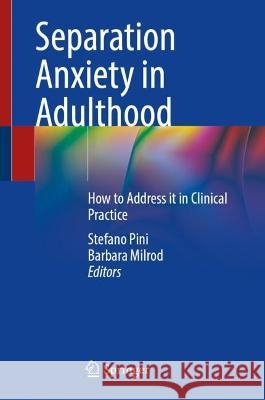Separation Anxiety in Adulthood: How to Address It in Clinical Practice » książka



Separation Anxiety in Adulthood: How to Address It in Clinical Practice
ISBN-13: 9783031374456 / Angielski
Separation Anxiety in Adulthood: How to Address It in Clinical Practice
ISBN-13: 9783031374456 / Angielski
(netto: 383,36 VAT: 5%)
Najniższa cena z 30 dni: 385,52
ok. 16-18 dni roboczych.
Darmowa dostawa!
Attached
Stefano Pini, MD, is a Professor of Psychiatry at the Department of Psychiatry, School of Medicine, University of Pisa, Italy. He is currently the Director of the Innovations in Psychiatric Treatments Program, Department of Psychiatry, University of Pisa, Azienda Ospedaliera Universitaria Pisana. Dr Pini is a member of the European College of Neuropsychopharmacology (ECNP); of the American Psychopathological Association (APPA); and of the ECNP Anxiety Disorders Research Network (ADRN). His research interests include: clinical characterization and treatment of comorbidities between mood and anxiety disorders, bipolar and schizophrenia spectrum disorders, and clinical and neurobiological correlates of anxiety disorders. He has participated in several international and national multicentre studies and received institutional grants for studies on clinical, biological and psychosocial aspects of bipolar disorder and clinical and the neurobiological characterization of adult separation anxiety disorder. He has been principal investigator for numerous clinical trials on the efficacy of antidepressants and atypical antipsychotics. Dr Pini has published in the most relevant peer-reviewed international scientific journals and serves as a reviewer for numerous psychiatric journals.
Barbara Milrod is Professor of Psychiatry, Director of Psychotherapy Research at PRIME (Psychiatric Research Institute of Montefiore Einstein), Albert Einstein Medical College, Bronx, NY, United States. She was awarded her medical degree from the Columbia College of Physicians and Surgeons, New York, United States. She did her residency training in adult and child psychiatry at the Payne Whitney Clinic in New York, at the Weill Medical College of Cornell University, and trained in psychoanalysis at the New York Psychoanalytic Institute. She serves on the Editorial Board of the Psychoanalytic Psychotherapy journal and on the Editorial Board of the Depression & Anxiety journal. She is Chair of Scientific Paper Prize Committee, American Psychoanalytic Association. She was awarded the Distinguished Psychiatrist Award, American Psychiatric Association in 2015. She was the first person to manualize a brief psychodynamic psychotherapy for any DSM anxiety disorder, Panic Focused Psychodynamic Psychotherapy (PFPP), which is the first psychodynamic psychotherapy to have demonstrated, replicated efficacy for any anxiety disorder.
This book presents data that challenges the long-established view that separation anxiety disorder should be reserved for diagnosis among children and adolescents by demonstrating that adult-onset is prevalent in many countries and that adult-onset separation anxiety disorder is just as persistent and impairing as the pediatric-onset form. Separation anxiety disorder in adulthood is associated with high levels of disability. Research and clinical data indicate that overlooking the diagnosis of adult separation anxiety disorder may result in substantial costs in the form of disability and suffering.
Over the last decades, the Psychiatry School of Pisa, in the person of Director Giovanni B. Cassano, M.D. and Stefano Pini, M.D. has conducted seminal studies in this area and brought research data into clinical practice. At the same time, the Pisa School has made a paramount contribution to the DSM-5 reformulation of adult separation anxiety disorder, which has since been transferred to the Anxiety Disorders chapter.
Barbara Milrod, M.D. is an unusual clinical investigator. She has conducted clinical research in separation anxiety disorder, panic disorder and post-traumatic stress disorder for the past two decades. She has incorporated separation anxiety constructs into her approach to mechanisms of psychotherapy research across these disorders, and in affect-focused psychotherapies.
The book consists of 10 chapters organized into two sections: a General Principles Section and Diagnosis and Treatment Section. The first section focuses on the biological underpinnings of separation anxiety and on the historical pathways that led to its DSM-5 categorization; the second elaborates on clinical topics, preventive strategies and treatments.
This book will help the reader to understand and diagnose separation anxiety disorder and to bear it in mind during the differential diagnosis of patients of all ages presenting not only with anxiety but also with a variety of psychiatric and behavioral disorders.
1997-2026 DolnySlask.com Agencja Internetowa
KrainaKsiazek.PL - Księgarnia Internetowa









